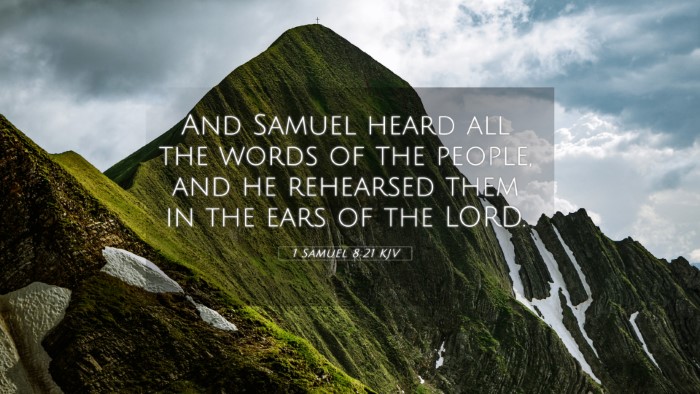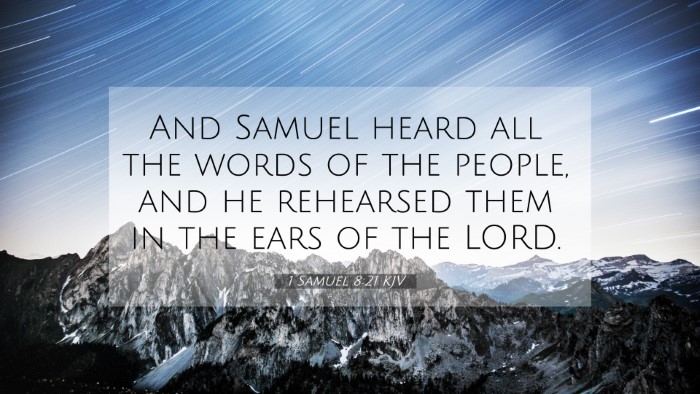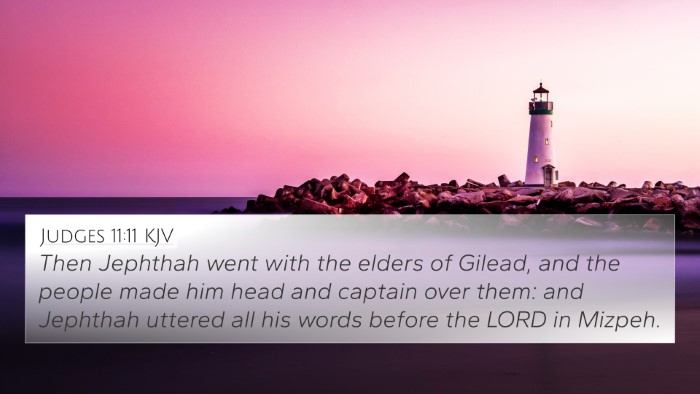Understanding 1 Samuel 8:21
Bible Verse: 1 Samuel 8:21 - "And Samuel heard all the words of the people, and he rehearsed them in the ears of the Lord."
Summary of the Verse
This verse captures a pivotal moment in the history of Israel when the people demand a king. Samuel, as the prophet, relays their desires to God, indicating both their rejection of divine leadership and the longing for human authority.
Interpretation from Public Domain Commentaries
-
Matthew Henry:
Henry highlights the earnestness of the people's request for a king and Samuel's role in communicating their desires to God. He emphasizes that this act illustrates a dissatisfaction with God's kingship and a desire for worldly governance, underscoring a significant turning point where human leadership was mistakenly sought over divine guidance.
-
Albert Barnes:
Barnes details how the people's plea signifies a shift in Israel's theocratic governance. He points out the implications of choosing a human king, which would lead to desiring approval from a mortal rather than God. This moment reflects the human tendency to seek control through visible authorities rather than trusting in God's unseen reign.
-
Adam Clarke:
Clarke discusses the nature of Samuel's response. He explains that Samuel's task was not merely to relay the message but to understand the gravity of the situation. Samuel's communication with God illustrates the prophetic intercession, where the leader must convey the collective wishes of the people while also seeking divine wisdom in their desires.
Thematic Connections
This verse not only stands alone but is deeply interconnected with various biblical themes and scriptures. The themes of leadership, authority, and the relationship between God and His people are woven throughout the fabric of Scripture. Below we explore some primary cross-references that help to elaborate on the significance of 1 Samuel 8:21.
Key Cross References
-
1 Samuel 10:1 - "Then Samuel took a flask of oil and poured it on his head and kissed him and said, 'Has not the Lord anointed you to be prince over his people Israel?'"
This verse illustrates God's transition to human kingship with Saul's anointing, continuing the narrative of Israel’s choice for human governance.
-
Deuteronomy 17:14-15 - "When you come to the land that the Lord your God is giving you, and you possess it and dwell in it, and then say, 'I will set a king over me, like all the nations that are around me,' you may indeed set a king over you whom the Lord your God will choose."
This scripture foreshadows Israel’s desire to have a king, showing that God already permitted this desire, but it should be rooted in His choice rather than human urgency.
-
1 Samuel 12:12-15 - "And when you saw that Nahash the king of the Ammonites came against you, you said to me, 'No! But a king shall reign over us,' when the Lord your God was your king."
This passage underscores the irrationality of Israel’s demand for a king, emphasizing the folly in replacing God’s authority with human kingship.
-
Psalm 78:68-72 - "But he chose the tribe of Judah, Mount Zion, which he loves… and he chose David his servant and took him from the sheepfolds."
This highlights God's ultimate selection of a leader for His people, contrary to their immediate demand, showing His sovereign choice over their decision.
-
Isaiah 33:22 - "For the Lord is our judge; the Lord is our lawgiver; the Lord is our king; he will save us."
Reiterates God's intended governance over Israel, contrasting the human kingship they request.
-
1 Peter 2:9 - "But you are a chosen race, a royal priesthood, a holy nation, a people for his own possession, that you may proclaim the excellencies of him who called you out of darkness into his marvelous light."
This New Testament passage connects to the theme of God’s chosen people, reinforcing the idea that believers are governed by God's rule rather than earthly kings.
-
John 18:36 - "Jesus answered, 'My kingdom is not of this world. If my kingdom were of this world, my servants would have been fighting…'"
Jesus emphasizes the nature of His kingship, which contrasts with the earthly kings the Israelites sought, illustrating a deeper understanding of divine authority.
-
Romans 13:1 - "Let every person be subject to the governing authorities. For there is no authority except from God, and those that exist have been instituted by God."
This passage underscores the importance of divine sovereignty even in human leadership, critical in understanding the implications of Israel's demand for a king.
-
Ephesians 1:22-23 - "And he put all things under his feet and gave him as head over all things to the church, which is his body, the fullness of him who fills all in all."
Affirms Christ's ultimate authority, echoing the idea that God’s lordship surpasses human desires for worldly governance.
Conclusion
1 Samuel 8:21 provides a deep well of insight into the nature of leadership, faith, and the human condition. By reviewing various cross-references, we see how this moment in Israel's history reverberates through Scripture, revealing God's clarity in authority and the complexities of human choices. This serves as a reminder for believers to discern their desires through the lens of God's sovereign plan.
SEO Keywords
This content can assist in identifying Bible verse cross-references and connections between Bible verses. It also provides tools for Bible cross-referencing and understanding the Bible verse parallels that impact theological studies.



